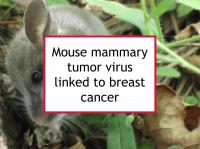The causes of breast cancer are varied, including hereditary, hormonal, environmental, and dietary and other lifestyle factors. Certain viruses have also been reported to be associated with breast cancer. Among them are bovine leukemia virus (BLV), Epstein-Barr virus, and human papilloma virus (HPV).
Mouse mammary tumor virus (MMTV) also has long been suspected as a potential contributing cause of some breast cancers in women. MMTV-like gene sequences are estimated to be present in approximately 40% of nonfamilial breast cancers in U.S. women and an even higher proportion in cases of inflammatory breast cancer (IBC) and pregnancy-associated breast cancer. Now a new study has presented the evidence for a causal role in breast cancer for MMTV-like virus.
Mouse mammary tumor virus (MMTV) and breast cancer
DNA with approximately 95% of MMTV sequences has been found in some human breast cancers. The worldwide incidence of breast cancer appears to correspond to the ranges of different species of wild mice, with the highest rate found in countries where Mus domesticus is the predominant species of house mouse. This has led some researchers to conclude that humans acquired MMTV from mice. However, the virus appears to have mutated over time in humans—researchers have discovered subtle differences between the mouse virus and the MMTV found in women. Hence, the human variant is now referred to as mouse mammary tumor-like virus or human mammary tumor virus (HMTV).
Latest research finds plausible link between HMTV and BC
The study referenced above was designed to evaluate the link between mouse mammary tumor viruses and human breast cancer. The support for causality is based on the following factors: (1) MMTV is capable of infecting breast epithelial cells; (2) MMTV-like gene sequences are more widespread in breast cancer tissue than in normal tissue; (3) antibodies to MMTV are more prevalent in women with breast cancer; (4) MMTV-like gene sequences are found in human milk, with a higher prevalence in women at higher risk for breast cancer; and (5) MMTV-like virus breast cancer is very similar to MMTV-associated mouse mammary tumors.
MMTV can infect human breast epithelial cells and integrate easily into the genome of such cells. MMTV-like gene sequences are 15 times more prevalent in breast cancer than in normal breast tissue. Such gene sequences have been found in the breast tissues of women one to 11 years before they develop MMTV-like breast cancer. MMTV antibodies are five times more prevalent in the serum of breast cancer patients than in cancer-free women.
MMTV-like gene sequences are found in human milk from cancer-free lactating women, with increased prevalence in milk from women at higher risk of breast cancer. MMTV-like virus associated breast cancer is remarkably similar to MMTV mouse mammary tumors. MMTV-like gene sequences have also been found in dogs, cats, monkeys and rats. Saliva appears to be the most likely means of human to human transmission from human to human and possibly from dogs to humans.
The authors conclude that a causal role for MMTV-like viruses in human breast cancer is highly likely.
Please see our virus tag for more information.
